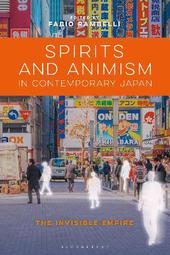
|
Spirits and Animism in Contemporary Japan: The Invisible Empire
Paperback / softback
Main Details
| Title |
Spirits and Animism in Contemporary Japan: The Invisible Empire
|
| Authors and Contributors |
Edited by Professor Fabio Rambelli
|
| Physical Properties |
| Format:Paperback / softback | | Pages:240 | | Dimensions(mm): Height 234,Width 156 |
|
| Category/Genre | Oriental religions |
|---|
| ISBN/Barcode |
9781350200548
|
| Classifications | Dewey:147 |
|---|
| Audience | | Tertiary Education (US: College) | |
|---|
| Illustrations |
20 bw illus
|
|
Publishing Details |
| Publisher |
Bloomsbury Publishing PLC
|
| Imprint |
Bloomsbury Academic
|
| Publication Date |
26 November 2020 |
| Publication Country |
United Kingdom
|
Description
This book draws attention to a striking aspect of contemporary Japanese culture: the prevalence of discussions and representations of "spirits" (tama or tamashii). Ancestor cults have played a central role in Japanese culture and religion for many centuries; in recent decades, however, other phenomena have expanded and diversified the realm of Japanese animism. For example, many manga, anime, TV shows, literature, and art works deal with spirits, ghosts, or with an invisible dimension of reality. International contributors ask to what extent these are cultural forms created by the media for consumption, rather than manifestations of "traditional" ancestral spirituality in their adaptations to contemporary society. Spirits and Animism in Contemporary Japan considers the modes of representations and the possible cultural meanings of spirits, as well as the metaphysical implications of contemporary Japanese ideas about spirits. The chapters offer analyses of specific cases of "animistic attitudes" in which the presence of spirits and spiritual forces is alleged, and attempt to trace cultural genealogies of those attitudes. In particular, they present various modes of representation of spirits (in contemporary art, architecture, visual culture, cinema, literature, diffuse spirituality) while at the same time addressing their underlying intellectual and religious assumptions.
Author Biography
Fabio Rambelli is Professor of Japanese Religions and International Shinto Foundation Endowed Chair in Shinto Studies at the University of California, Santa Barbara, USA. He is series editor of Bloomsbury Shinto Studies, and his publications include The Sea and the Sacred in Japan (Bloomsbury, 2018) and A Buddhist Theory of Semiotics (2013).
Reviews[The] diversity of approaches and subjects in Spirits and Animism render "visible" the complexities of an invisible realm in ways that will excite scholars and students of Japanese religions and entice those working in comparative fields. * Nova Religio * Brings together research from many promising young researchers who take a fresh look at the role of religion (in this case focusing on "spirits") in modern and contemporary Japanese society. * Japanese Journal of Religious Studies (joint-reviewed with The Sea and the Sacred in Japan) * Overall, this book is interesting and well worth reading. * Anthropos * For those interested in this sub-field of studies and Japanese religions in general, this book will certainly represent a valuable source and suggest new avenues for further research. * Religious Studies Review * In recent years, debates about the use of the term 'animism' have resurfaced as the ontological turn has reinvigorated the concept. This timely and diverse collection of essays contributes to these conversations by interrogating how the concepts of animism and spirits have been deployed in modern and contemporary Japan. * Barbara R. Ambros, Professor of East Asian Religions, University of North Carolina at Chapel Hill, USA * This thoughtful collection of essays explores ideas and representations about 'spirits' and discourses about animism in modern and contemporary Japan by offering original and thought-provoking contributions. Highly recommended. * Erica Baffelli, Senior Lecturer in Japanese Studies, University of Manchester, UK * This is an important, timely, and very rich volume. The authors critically examine modern uses of the term "animism" in Japan, analyse various types of spirit belief in their historical contexts, and offer compelling new interpretations of popular culture, from anime to forest therapy. A much-needed respite from the numerous essentialist celebrations of Japanese "Shinto animism" in recent academic and media discourse. * Aike P. Rots, Associate Professor of Asian Studies, University of Oslo, Norway, author of Shinto, Nature and Ideology in Contemporary Japan: Making Sacred Forests (Bloomsbury 2017). * This is a fascinating collection of perspectives on the place of 'spirit' in modern and contemporary Japan, produced by some of the top scholars in the field. It offers a balance of breadth and nuance that guarantees something of interest for specialists and non-specialists alike. We come away with a vivid, unforgettable sense of how spirit pervades Japanese life - bringing meaning and energy to such diverse areas of life as family, relationships, war, commerce, art, memory, the environment, and people's sense of hope or dread about the future. A real treat. * Chris Harding, Senior Lecturer in Asian History, University of Edinburgh, UK, author of Japan Story: In Search of a Nation, 1850 to the Present (2018) *
|